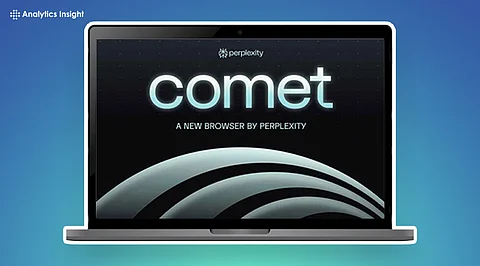

Perplexity AI Shaking the static web-browsing industry with its AI-browser Comet initiation task-automation.
Perplexity CEO confirmed his discussions with mobile manufacturers regarding making Comet a default in smartphones.
Hurdles still remain and overcoming them will ensure this AI-browser’s success in the industry.
Google has been dominating the world of web browsers for decades. This section remained static for a long time until Perplexity entered the race with its latest AI browser, Comet. Announced in July 2025, it marks a bold leap forward, introducing an AI-agent platform that combines browsing, searching, and task automation to form a unified experience.
With its deep integration of Perplexity, this AI web browser aims to dismantle the norms set by traditional browsers like Chrome, Safari, and Edge over the years. To challenge Google’s monotony, Perplexity is reportedly planning to make this new browser the default option or pre-load it.
Is it really that powerful or just hype? Let’s figure out if Perplexity can really change the browser game across the globe.
The promotion of Comet highlights that it’s designed to reimagine the web browsing experience in the AI era. The beta version was launched early in July, and currently, it is available for the ‘Perplexity Max’ subscribers on desktop. This subscription costs users around $200 per month. Built on Chromium, this new AI web browser supports familiar features such as tabs, extensions, and the browsing UI. The highlights involve
Natural‑language agent: Users can ask Comet to summarize webpages, compare product prices, and even with proper commands, this AI browser can manage emails and calendar events.
Automation intelligence: Comet can type, click, autofill, and execute multi-step tasks like shopping and scheduling across sites.
Citable trust: This is the signature feature of Perplexity. The web-based AI browser also draws from authentic sources and cites them for a transparent search model. This increases its credibility.
These features are indeed impressive, and most importantly, this browser is still in development. With backing from renowned organizations and entities such as Nvidia, Jeff Bezos, and Eric Schmidt, and a valuation of around $18 billion, Perplexity has both ambition and a solid runway.
Also Read: How to Use Perplexity AI API: Free and Pro Methods Guide
The browser industry was static for a long time. With the appearance of Comet, it currently faces a stir, but precisely, the browser wars don’t only depend on rendering speed or UI gimmicks; instead, it’s more about capturing the market as the default browser.
Currently, Google Chrome holds more than 70% of the global mobile browser share. The rest is captured by Apple’s Safari and Samsung Internet. On Android, especially, users have the chance to switch default browsers, but rarely do they prefer something other than Chrome.
Perplexity is diving into this war, as the CEO Aravind Srinivas confirmed the company is in talks with smartphone manufacturers regarding this matter. As per the reports, companies like Samsung and Motorola are on the list that Perplexity wants to have Comet pre-installed on or set as the default browser. At the same time, the CEO mentioned the challenges: “It's not easy to convince mobile OEMs to change the default browser to Comet from Chrome.”
If these discussions yield something fruitful, it will drastically change the scenario. As soon as companies like Samsung or Motorola start featuring Perplexity Comet as the default browser, the user adoption will instantly increase and introduce AI-powered workflows into millions of daily sessions.
Yet, persuading OEMs to swap out Chrome is no small feat. Users are generally complacent, relying on pre-installed software unless compelled to switch. Therefore, the success of Comet’s mobile expansion is massively dependent on OEM partnerships.
Also Read: How to Use Perplexity’s AI Chatbot to Generate Videos
Comet represents a philosophical shift from passive web browsing to proactive AI‑driven experiences. The Perplexity CEO has called AI browsers “the next killer app,” which will offer superior context awareness compared to standalone chatbots because they understand browsing history, logins, tabs, and user intent.
Perplexity’s Comet has taken a significant step in the evolution of web browsers. With AI-powered task automation, real-time citation, and a design rooted in intelligent context, the Perplexity AI browser represents a meaningful departure from traditional browsers.
Obstacles still remain, but the Comet Perplexity Browser represents a broader shift toward active AI agents. This AI browser may or may not win the browser war. Still, if Perplexity continues to enhance its automation capabilities, increase speed, and foster strategic OEM deals, it will lead the way for future AI browsers to follow suit.
What is Perplexity’s Comet AI browser?
Ans: Comet is an AI-powered browser with a built-in assistant that can summarize content, manage tabs, and automate web tasks. It uses Perplexity’s ‘answer engine’ and is currently accessible to Max subscribers and early invitees.
How does Comet compare to Google Chrome and Microsoft Edge?
Ans: Unlike Chrome and Edge, Comet centers AI-generated answers and agentic automation, not just AI chat integration. Comet replaces web search with contextual AI summaries and lets users perform actions across browsing tasks right from a sidebar.
What unique features does Comet’s AI bring to everyday browsing?
Ans: Comet summarizes articles, manages tabs, automates form fills, schedules events, and performs controlled web actions. Users can chat directly with any web page’s content and even instruct the AI to ‘take control’ for complex workflows.
Is Comet available for all users?
Ans: Comet is currently offered to Perplexity Max subscribers and select invitees. Broader access is planned, including a free tier with limited features, but advanced AI automation will remain reserved for paid users.
Could Comet replace traditional search engines?
Ans: Comet directly integrates AI search, bypassing traditional engines with instant summaries and actions, potentially reducing the need for classic search. This model challenges Google’s dominance, especially if agentic browsing becomes mainstream
